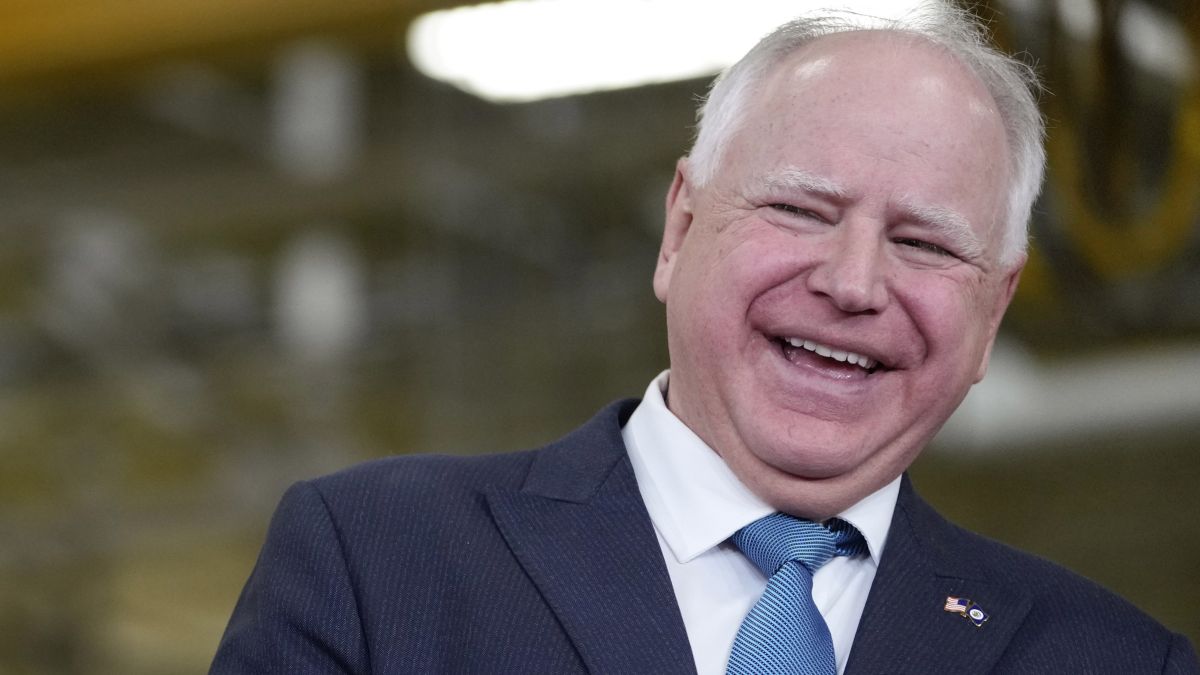The guessing game is over. Kamala Harris has picked Tim Walz as her running mate in the US presidential election.
Harris on Tuesday unveiled Minnesota Governor Tim Walz as her vice presidential candidate for the US election in November, saying she was “proud” to choose him as her running mate. “As a governor, a coach, a teacher, and a veteran, he’s delivered for working families like his. It’s great to have him on the team,” Harris said on X.
Walz will become vice president if Harris beats Donald Trump in the US presidential election.
Harris’s decision speaks a lot about the power of social media. Walz became an internet sensation after his recent attacks on Republicans as “weird”. It has caught on and how.
The vice president has adopted the modifier and now it’s part of the Democratic strategy when talking about Trump or his running mate, JD Vance. This unconventional yet effective label has sparked a significant shift in the political discourse, marking a notable departure from the more serious tones of previous campaigns.
How did this “weird” label come up?
The term “weird” first gained traction when the Minnesota governor used it in several public appearances. Walz, who chairs the Democratic Governors Association, referred to Trump and Vance as “just weird” during a viral MSNBC interview.
Impact Shorts
More ShortsThe Democratic Governors Association amplified this label on social media, and soon, the Harris campaign incorporated it into their messaging. The use of the term “weird” serves as a concise and relatable description that captures the discomfort many feel towards the extreme rhetoric and actions of the Trump-Vance campaign.
David Karpf, a strategic communication professor at George Washington University, told AP, “It frustrates opponents, leading them to further amplify it through off-balance responses.” This simple yet effective label has proven difficult for the Republican side to counter, as it touches on the broader unease with their political positions and behaviour.
“I don’t know who came up with the message, but I salute them,” added Karpf.
Are Trump and Vance “weird”?
The Democrats’ use of the “weird” label has been bolstered by specific incidents and statements from Trump and Vance. For instance, Vance’s comments about people without biological children not having a “direct stake” in the country were described as “super weird” by US Senators Brian Schatz (D-Hawaii) and Chris Murphy (D-Connecticut).
This remark drew significant backlash, highlighting a dismissive attitude towards individuals and families with different life choices.
In another instance, Harris’ campaign released a statement following Trump’s appearance on Fox News, titled “Statement on a 78-Year-Old Criminal’s Fox News Appearance,” which included the phrase “Trump is old and quite weird?”
This release was part of a broader strategy to paint Trump and his associates as out of touch and strange.
Is this strategy working?
This campaign tactic marks a significant shift from the previous high-minded and serious tones of political discourse under US President Joe Biden. Biden’s campaign had often focused on themes of democracy and the “soul of the nation,” but polling indicated that voters were equally split on whether Biden or Trump would better protect democracy.
The Harris campaign’s approach, however, is more down-to-earth and resonates with everyday conversations, offering a stark contrast to the often apocalyptic language used in political arenas.
Tim Hogan, a Democratic strategist, pointed out the relatability of the term, telling Politico, “It’s simple. It’s how you might talk to your neighbour about the crazy political climate we’re living in.”
The label “weird” encapsulates the oddities and inconsistencies in the behaviour and policies of Trump and Vance, making it a powerful tool for the Democrats.
How are Republicans tackling this “weird” issue?
The Republican response has been largely defensive, struggling to counter the “weird” label. Trump spokesperson Steven Cheung and Donald Trump Jr. attempted to turn the tables by accusing the Democrats of trying to “gaslight everyone into thinking the shooting was staged,” and criticising Harris for being “soft on crime.” However, these responses have not effectively countered the narrative.
JD Vance tried to shift focus by criticising Harris’ discussions on “climate anxiety,” mocking the idea and suggesting that Democrats don’t want young people to start families.
He described these concerns as “really weird stuff,” inadvertently reinforcing the label that the Democrats have successfully applied to him and his party.
What does history say about simple labels like “weird”?
The use of the term “weird” also taps into a broader historical narrative. The Democratic campaign has subtly referenced past Republican tactics, such as John McCain’s 2008 attempt to paint Barack Obama as a celebrity without real accomplishments.
This current campaign strategy seems to co-opt Republican methods by applying a simple, yet impactful label that resonates on a gut level.
Moreover, the shift in campaign tone reflects a broader change in Democratic strategy under Harris’ leadership. The campaign has embraced a more conversational and relaxed approach, exemplified by Harris’ speeches where she draws on her background as a prosecutor to criticise Trump.
She described Trump as a predator and fraudster, contrasting her own professional integrity with his controversial record.
The “weird” label encapsulates a wide range of criticisms against Trump and Vance, from their policy positions to their public personas. It’s a strategic move that simplifies complex issues into a relatable narrative, making it easier for the public to engage with and understand.
As the campaign progresses, it remains to be seen how this tactic will influence voter perceptions and whether it will continue to be a defining feature of the Democratic strategy.
With inputs from agencies
)